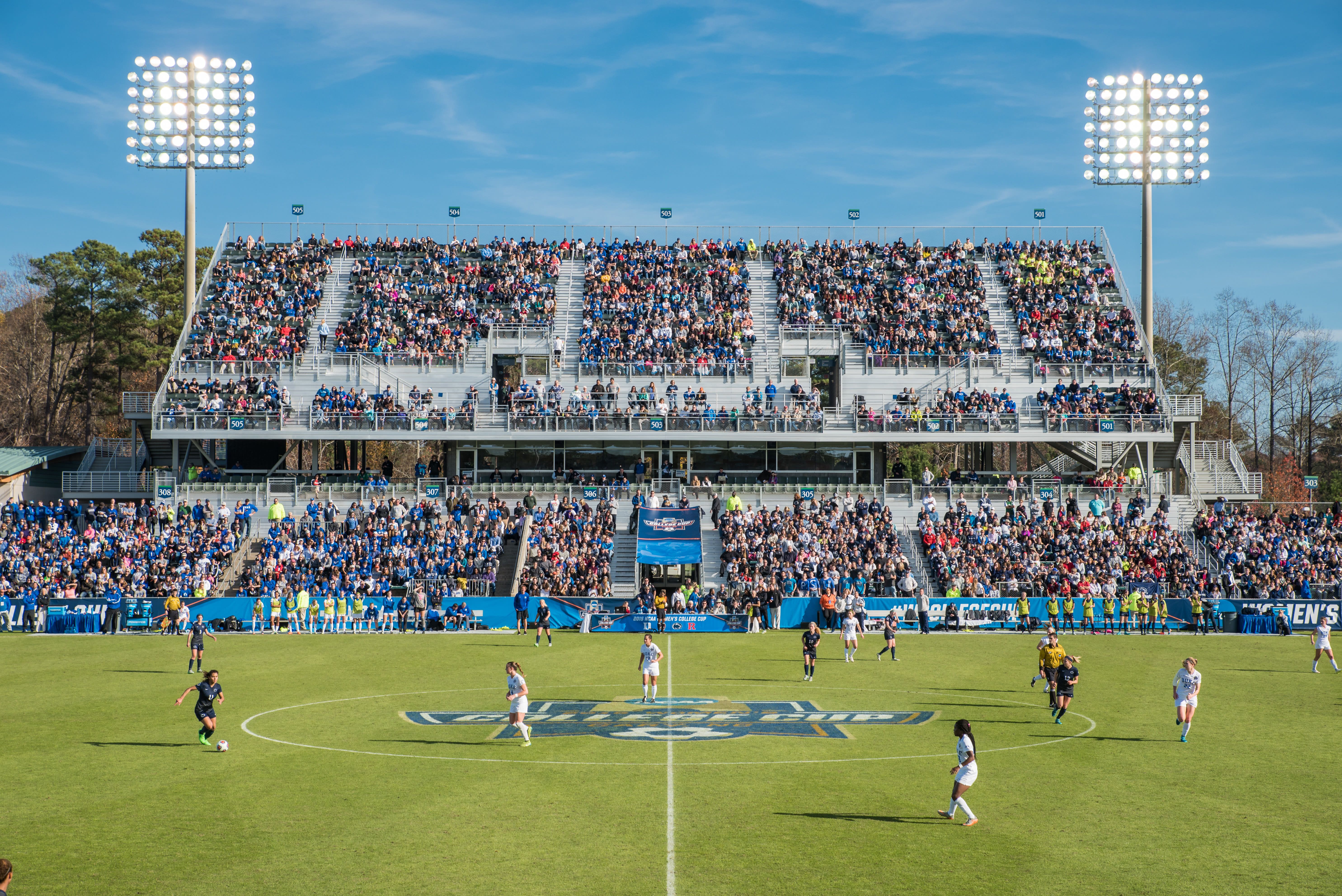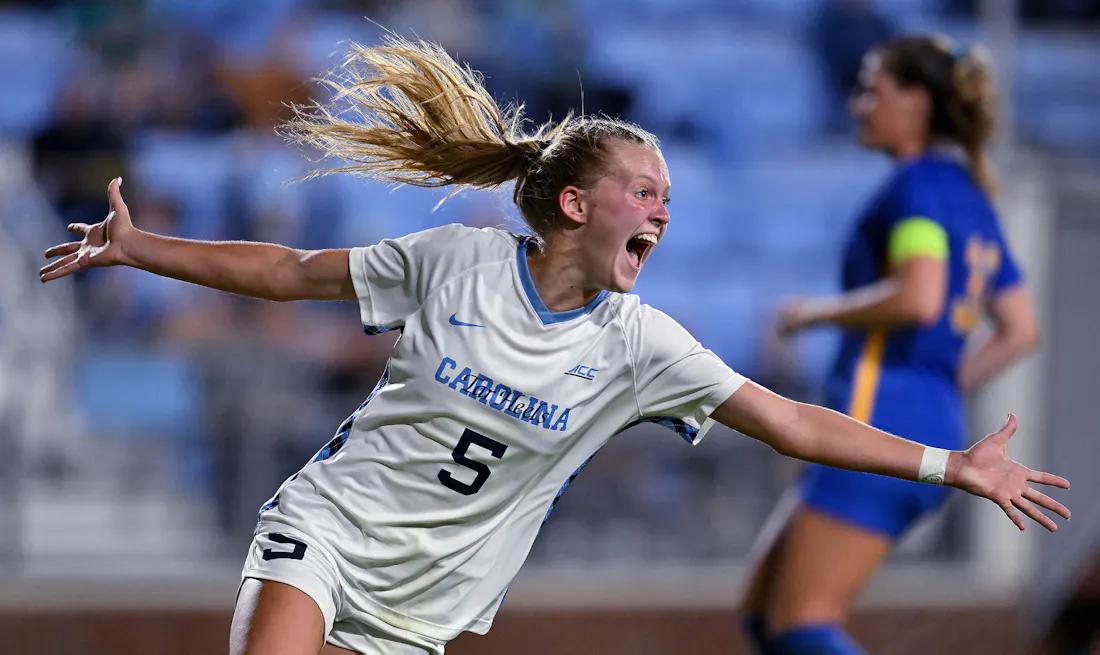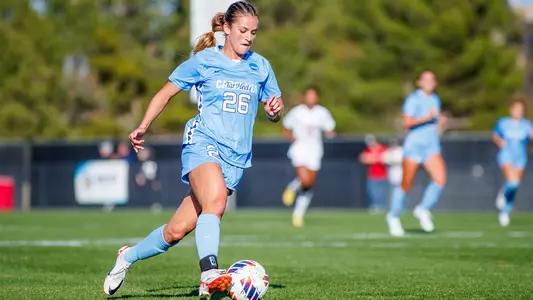North Carolina's Love Affair with Women's Soccer
A tradition of tight competition and community make North Carolina a rich field for fans and players alike.
Summary
- North Carolina schools like UNC and Duke consistently produce elite women’s soccer talent, impacting even international play.
- A deep-rooted soccer culture, strong fan base, and youth clubs fuel sustained success.
- ACC competition and in-state rivalries drive high-level play and top-tier recruiting.
Cheerwine, barbecue, and women's college soccer: three things the state of North Carolina doesn't play about. There have only been 13 national championships that didn't feature at least one team from the state.
The legacy doesn’t stop at state borders either. During the 2025 Women’s Euros, three of the Lionesses and Head Coach Sarina Wiegman played college soccer in North Carolina—all three at the University of North Carolina (UNC). In a country that doesn’t always support its soccer teams, North Carolina seems to have found the magic formula to produce high quality soccer.
What is it exactly that makes North Carolina soccer so special? Well, just about everyone has a theory.

In 2024, Noah Wyatt drove all the way up to Cary, NC from Jacksonville, FL to see UNC versus Wake Forest in the NCAA National Championship. He attributes the success of North Carolina soccer to the culture. "You've got Duke, NC State, Wake is a little bit of an outlier there, and of course, North Carolina," said Wyatt. He adds coaching as another impact, but insists "the culture of the game in the state itself has just grown so much, especially in the women's game." That culture is reinforced by the unique and vocal fan base for each college.
Women’s college soccer didn’t take off in the state until after the enactment of Title IX in 1972. UNC led the charge in 1979, followed by NC State and Duke in the 80s, and Wake Forest in 1994.
Despite soccer not being “a sport people my age played if they were female,” Genevieve Exum-Francis and her friend Cheryl Blackwell are two of the 9,475 fans who attended the National Championship. Blackwell has a debate pin her grandfather wore when he attended Wake Forest, well before women were admitted onto the campus. Both women have been fans of college soccer for 10 years now.
It’s also a matter of young women choosing the intensely competitive culture that four colleges in relatively close proximity all in the same powerhouse conference, create. Matt Dahlien (yes, father to Maddie Dahlien, UNC’s underrated playmaker) asserts the area is "a soccer hotbed." But, he points out that it's not just the area, it’s the ACC. "If you want to have these moments and you wanna be able to play at the top level and play at the College Cup,” he adds, “I would tell any girl that's looking to get recruited they gotta look at Carolina schools." The combination of high intensity ACC soccer paired with local college soccer rivalries pushes everyone in the area to improve.

The power of the ACC is hard to ignore. Multiple fans reference the conference as creating and then reinforcing the culture that creates a soccer hotbed.
"It has a lot to do with the fact that these two teams are in the same conference. And this conference is well-represented in the state," said Jim Robinson, longtime friend of Wake Forest Head Coach Tony da Luz. The two have known each other for most of the 28 years da Luz has been with the Demon Deacons. With the ACC being a historic powerhouse and largely accepted as the number one college soccer conference, there doesn't need to be anything special about the state to draw recruits. Still, Robinson added, "I would imagine some of the kids that get recruited from the Northeast like the idea of playing in an environment where it's not perpetually cold during the soccer season."
David Abercrombie, without hesitation, says what makes North Carolina soccer special is "the history of the ACC as a strong conference." But he also credits , “the luck of the draw” . “Any given day, any of the top ten teams could have beaten any of the other ones," he notes. If it's the ACC and the luck of the draw, then, historically, the Tar Heels at least are lucky, having had the game go their way more often than not.
A group of girls sitting in the bleachers just to the right of the goal come to a collective answer on what's special about North Carolina soccer. "The community!" shouts the group as one girl in particular, Sarah Smith, chimes in with, "I think it's just the environment that everyone creates and the fans that come together. And then the youth soccer programs that the state has." Like the majority of the fans at the National Championship, the girls are rooting for UNC.
The community and culture start younger than college, with club-specific infrastructure. "We have a lot of draw with the competitive club scene, plus the draw with the Courage," hypothesizes Emily Foley. The youth competitiveness is aided by having "really high level college teams and the women's team here." Kids growing up and playing soccer can see the best of the best without having to watch on TV.
It’s an answer that’s seconded, independently, by father-daughter duo Scott and Ella Bailey. North Carolina has "a lot of talent and a concentration of good schools," Scott points out. "I know Coach Damon has a good program and base in Cary for development, and having NCFC [North Carolina FC] here really helps." Ella Bailey seconds all of that, having been a college soccer fan "since I was born." (Scott Bailey adds "about ten years.")
Getting hooked on North Carolina soccer starts young. Blake Blanchard’s little sister is shy, and he can't get her to answer, despite her going to more UNC games than he has. Eventually, he summarizes for her, laughing, “There's just a lot of kids growing up around this area that like to play and want to play.”

In the end, it ties back to the culture of fans turning out to support the college teams in the area. "Here we support our sports, especially football and soccer. And when you have good teams and people that are family oriented, people have a lot of fun." Kim Dillard is quick to add “soccer is amazing, it's fun.” Talent and success create a product that people want to go out and support, further elevating the experience and in turn drawing more fans to the sport.
North Carolina boasts some of the strongest college soccer programs in the country—historically and in the present day. In most years, this upcoming season excluded, the College Cup is played at WakeMed Soccer Park in North Carolina, a testament to the state’s continuous relationship with the sport. Perhaps, the magic of the state is the symbiotic relationship between the college soccer programs, youth programs, and fans who show up year after year to put soccer on the map, reinforcing its importance and drawing yet more fans and participants to the game.
